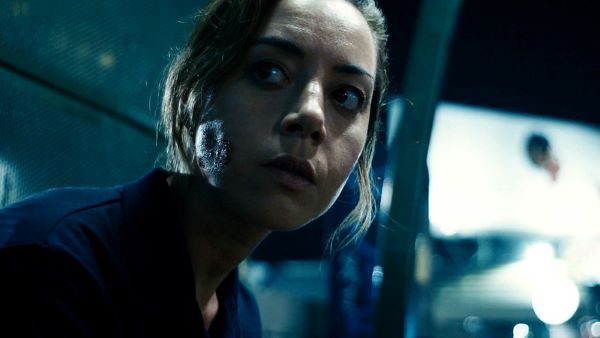![]() Director John Patton Ford’s tough-minded and spry feature debut starts off with a job interview from hell. Emily (a defiant Aubrey Plaza, also one of the film’s producers) is asked her about a charge on her permanent record. The man behind the desk quickly reassures her his company doesn’t normally run a background check on job applicants, but because the job entails private medical files, he needs to ask sensitive questions, and she calmly tells all about a DUI misdemeanor from years ago. However, in the follow-up question, the interviewer presses on and inquires about an earlier assault change before readily admitting that he has already read her official background file. Feeling misled and ambushed, Emily replies she won’t explain the felony as she drops one or two F bombs and storms out.
Director John Patton Ford’s tough-minded and spry feature debut starts off with a job interview from hell. Emily (a defiant Aubrey Plaza, also one of the film’s producers) is asked her about a charge on her permanent record. The man behind the desk quickly reassures her his company doesn’t normally run a background check on job applicants, but because the job entails private medical files, he needs to ask sensitive questions, and she calmly tells all about a DUI misdemeanor from years ago. However, in the follow-up question, the interviewer presses on and inquires about an earlier assault change before readily admitting that he has already read her official background file. Feeling misled and ambushed, Emily replies she won’t explain the felony as she drops one or two F bombs and storms out.
The small cracks of vulnerability and fear that seep through Emily’s poker-face façade permeate this well-plotted, unglamorous crime drama. As with many heist films, the pleasure often lies in the initiation of a newbie into a crime ring, and that is true here. A former art student in her early thirties, Emily no longer paints, has a student loan debut of $70,000, and works for a catering company as an independent contractor earning no benefits. As a thank you for a favor, one of her co-workers gives her a tip: a phone number that could help her make a quick $200.
The call first leads to a scam involving buying a $2,000 flat screen TV using a credit card with stolen numbers, later a bruising mano a mano fight with a man twice her size, and a car chase. It also snowballs into a dependable source of cash after Emily learns to make fraudulent credit cards under the tutelage of one of the ringleaders, Youcef (Theo Rossi). Like a light-footed thief, the story line nimbly leads to a final windfall, a plan that couldn’t possibly ever, ever go wrong.
At the same time, another kind of opportunity, this one legit, comes from a hometown art-school friend, Liz (Megalyn Echikunwoke), who works at a glitzy ad agency. Should Emily go straight or sink further into a lucrative life of crime? Viewers who like steady tension and a narrative that maintains its stamina will find a reward in Emily taking the dangerous but moneymaking path.
As in Michael Mann’s Collateral, the movie covers a wide terrain away from familiar Los Angeles scenery. Among its destinations, the smooth handheld camera work takes viewers to Emily’s 1950s-style courtyard apartment, the industrial outskirts of the San Fernando Valley, and Youcef’s Lebanese American family gathering while offering only a glimpse of Hollywood glamour at Liz’s swanky office.
Emily’s resiliency and intrepid actions would give almost any pre-Code bad girl a run for her money. Because she immediately comes across as brittle, impatient, and, well, a bit too entitled to play by the rules, she’s not a likely Everywoman, which saves the film from succumbing to a contrite and contrived resolution. It’s too practical and hard-hearted for that. As a result, this is a successful blend of genre and slice-of-life economic stress, joining company with David Mackenzie’s 2016 neo-noir Hell or High Water and Steve McQueen’s 2018 heist film Widows. It’s a highly satisfying blend of a modern-day woman’s picture and a tidy, B-movie thriller. The damned don’t cry, indeed.
Emily the Criminal has been picked up by Roadside Attractions and is slated for a theatrical release later this year.







Leave A Comment